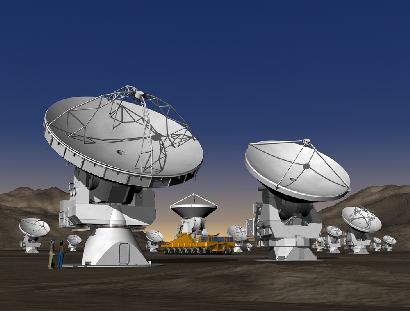
ALMA in Chile -- one of the `new-generation' of radio telescopes coming on line towards the turn of the decade. Algorithm development is needed now to make good early use of such telescopes.

A new generation of radio telescopes is almost upon us: with first light around 2010, the Atacama Large Millimetre Array (ALMA) in Chile is expected to surpass the capabilities of previous millimetre-wave interferometers by many orders of magnitude. The UK-based eMERLIN interferometer will provide complementary high-resolution data at longer wavelengths.
These instruments are expect to provide transformational science provided the data can be calibrated in the face of the many different ways in which the atmosphere and instrument corrupts the incident wavefronts from astronomical sources. These are tremendous challenges requring state-of-the-art techniques in high-perfomance computing (HPC) and a talented and flexible research student working at the interface between HPC and radio astronomy.
The first task in this project will be to use a matrix formulation encoding these corruptions, to develop efficient simulation tools for ALMA and eMERLIN. These tools will be developed in close collaboration with Jan Noordam and Oleg Smirnov at ASTRON.
As astronomical calibration is the inverse problem to simulation, the second task of the project will be to develop new calibration tools for use with ALMA and eMERLIN.
The third task in the project will be to commission such software on site in Chile and Manchester, and hence to be involved in the first attempts to extract new science from these facilities.
The fourth and final task will be to collect a PhD, and hopefully go on to a glorious career in astrophysics or computing.
If you are at all interested in this project
please have a look at
the poster and
contact any of the supervisors directly via email at the addresses
given below.
This project is part of a developing collaboration
between
the Oxford e-research centre
and
Oxford Astrophysics.
Steve Rawlings is Head of Astrophysics at Oxford. He has expertise in observational cosmology and has a developing interest in new-generation radio telescopes.
Ian Heywood is a Postdoctoral Reseacher in Oxford, and has developed simulation tools for new-generation radio telescopes including ALMA
Hans-Rainer Klöckner is a Postdoctoral Reseacher in Oxford, and is the SKA Design Study (SKADS) science simulations organiser throughout Europe.
Stef Salvini is a high-perfomance computing expert in
the Oxford e-research centre.